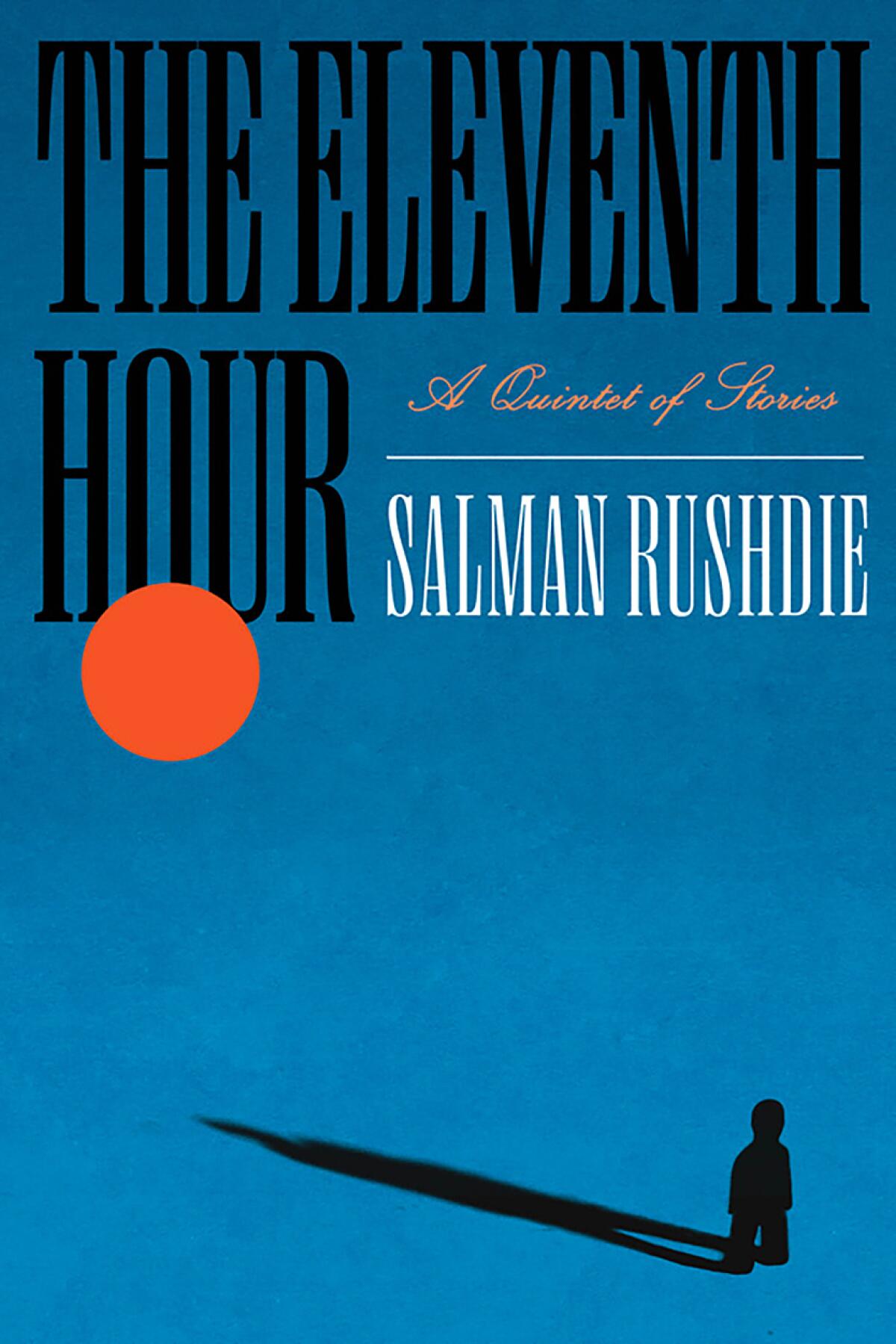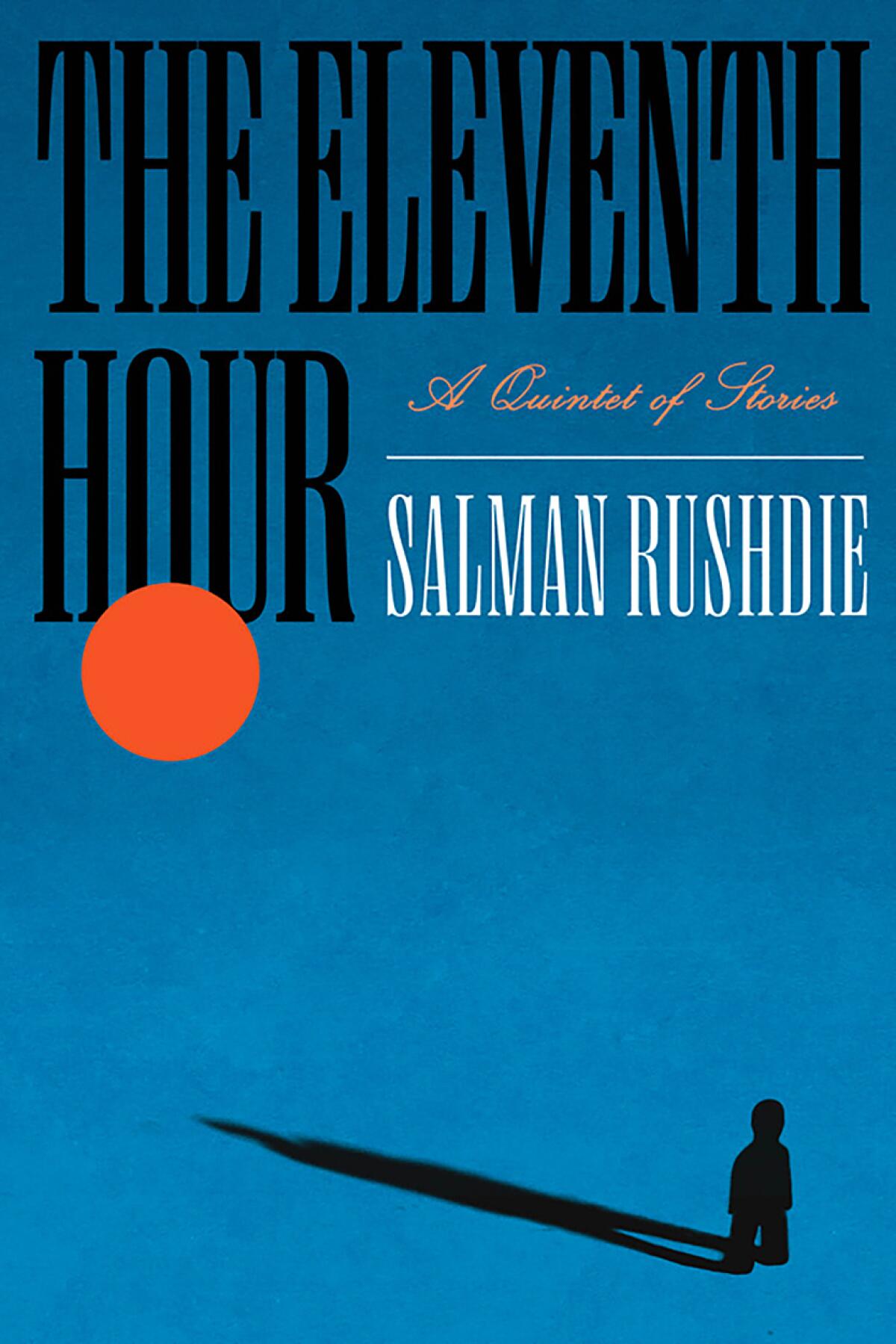Salman Rushdie’s first work of fiction since attack is potent, poignant
Book Review
The Eleventh Hour: A Quintet of Stories
By Salman Rushdie
Random House: 272, $29
If you buy books linked on our site, The Times may earn a commission from Bookshop.org, whose fees support independent bookstores.
As one century gives way to another, a child is born in Mumbai. “The millennium’s gift,” Chandni Contractor, is a source of joy to her parents. When Chandni turns 4 and reveals herself to be a musical prodigy, she becomes a source of wonder. At the age of 13, she dazzles audiences across India with her piano and sitar performances. Five years later, she enthralls Majnoo, the playboy son of billionaire parents, and the pair go on to have a spectacular wedding. But their marriage sours and her in-laws turn overbearing. Eventually Chandni snaps and wreaks havoc by playing a different kind of music, one that has the power to destroy livelihoods and lives.
“The Musician of Kahani” is one of five stories in a new collection by Salman Rushdie. “The Eleventh Hour” sees the acclaimed Indian-born British American author exploring the weighty matters of life and death. That he should choose to craft tales around these twin themes is hardly surprising. In 2022, he was nearly killed in a frenzied attack at an event in upstate New York. Two years later, in his up-close-and-personal memoir, “Knife,” he recounted his ordeal and told how he had come to embrace what he called “my second-chance life.” Rushdie’s brush with death and new lease on life renders his latest stories — his first fiction since the attack — all the more potent and poignant.
The collection’s opener, “In the South,” gets underway both innocently and ominously: “The day Junior fell down began like any other day.” What follows is a chronicle of a death foretold. Senior and Junior are two octogenarian neighbors in Chennai, India, who spend their time together arguing. The former has had a rich and fulfilling life, but as so many of his friends and family have died — or “gone to their fiery rest” — he now longs for death. The latter, afflicted by “the incurable disease of mediocrity,” has led a disappointing life yet still possesses a lust for it.

When a tsunami hits the city, it kills Junior. At first Senior is angry (“Why not me?” he rages), but his dominant emotion turns to sadness after he realizes he has lost a man who was his “shadow.” Or so he believes. For Junior’s passing is not the end. Senior continues to see, and quarrel with, his fallen friend. As Rushdie puts it: “Death and life were just adjacent verandas.”
One of the finest stories here, “Late,” involves another apparition. English academic S. M. Arthur wakes up in his university college (an unnamed King’s College, Cambridge) and discovers he is dead. Feeling like “a broken entity trapped in a kind of prison,” he finds peace by communing with the one person who can see him, Indian student and fellow lonely soul, Rosa.
The pair form a bond in the empty college over the Christmas holidays. Despite their affinity, Arthur harbors secrets. When Rosa is tasked with sorting his papers, she comes across a mysteriously locked box file, the contents of which he refuses to disclose. Then Arthur takes stock of his situation and decides he can’t rest until Rosa helps him get even with a past persecutor. What is in the box and why the need for revenge?
Weighing in at over 70 pages, “Late” constitutes more a novella than a story, as does “The Musician of Kahani” and the equally substantial “Oklahoma.” This last offering about writers, writing and elaborate vanishing acts is artfully structured and formally daring, made up of multiple layers, diverse references, literary ventriloquy and slick twists and turns. In a lesser writer’s hands, this novella might have been too clever for its own good; however, Rushdie, a seasoned pro, achieves the perfect balance.
He hasn’t done so in recent years in his long-form fiction. “The Golden House” (2017), “Quichotte” (2019) and his last novel, “Victory City” (2023), were blighted in places by digressive riffs and monologues, bottomless subplots, “humorous” character names (Evel Cent, Thimma the Almost as Huge) and excessive magic-realist high jinks comprising talking revolvers, ferocious mastodons, an Italian-speaking cricket and a demigoddess who grows a city from seeds and lives for 247 years. Sometimes this hocus-pocus worked wonders; at other times it felt like cheap tricks.
Rushdie has far more success in “The Eleventh Hour.” His narratives are more streamlined. His flights of fancy— malevolent music, undead scholars, imaginary brothers, a cult led by a guru with 93 Ferraris in an “experimental township” called the Moon — are more controlled and add subtle strokes of color. Some groan-inducing puns aside, Rushdie’s comic touches are deftly managed, appearing as sharp satirical swipes or witty repartee. “You look like a man who is only waiting to die,” says Junior to Senior, who in turn retorts: “That is better than looking, as you do, like a man who is still waiting to live.”
Rushdie exhibits further playfulness by scattering clues and inviting his reader to trace connections. Arthur is in part a crafty composite of the writer E.M. Forster and the computer scientist Alan Turing — all three being, like their creator, King’s College alumni. “And at midnight, the approved hour for miraculous births in our part of the world, a baby was born to a Breach Candy family,” Rushdie writes of Chandni, with a knowing nod to the key time, place and circumstances in his 1981 masterpiece “Midnight’s Children.”
The book’s last and shortest entry, the fabular “The Old Man in the Piazza,” makes for a somewhat slight coda. Otherwise, this is an inventive and engrossing collection of stories which, though death-tinged, are never doom-laden. With luck this master writer has more tales to tell.
Malcolm Forbes is a freelance writer and critic from Edinburgh, Scotland, who writes for the Economist, the Washington Post and other publications.

